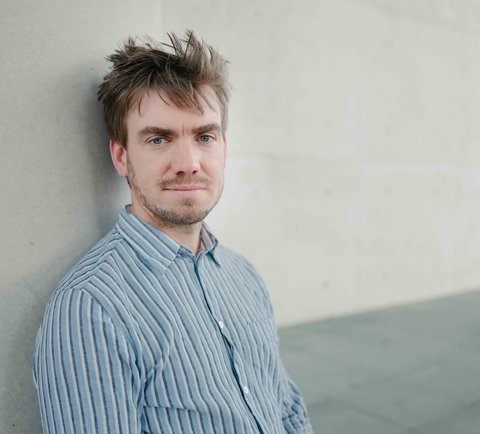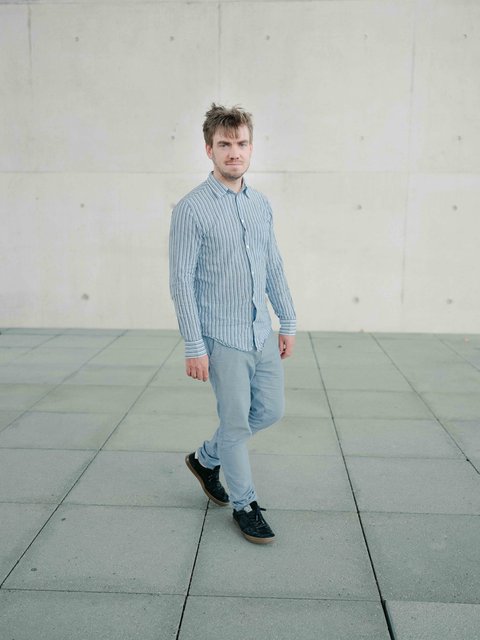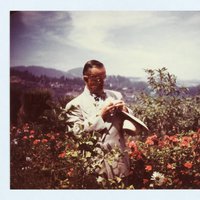Beethovenfest Artistic Director and 2025 Fellow at the Thomas Mann House, Steven Walter, looks back on his time in Pacific Palisades, Los Angeles, and ahead to the upcoming panel discussion with former and current Thomas Mann Fellows at Beethovenfest 2025.
Steven Walter about his Thomas Mann Fellowship
»The best thing ever done with the German language.«

The opening weekend of Beethovenfest, with its motto »Alles ultra« (»Everything ultra«), is now in full swing. What are your initial thoughts?
I am delighted with what has been a truly intense and wonderful opening weekend. We held numerous special events that lived up to the motto in terms of their concept and programme, and they were very well received by the audience. I am looking forward to the next three weeks with great excitement!
You are a big fan of Thomas Mann. How did that come about, and how does his work relate to music for you?
I first read »Tonio Kröger« when I was 14 or 15. I was impressed by how Thomas Mann had managed to express my feelings about life at that time! In my opinion, he is the greatest writer in the German language – he has an incredible ability to describe human psychology through language. His love of music is evident throughout all his works. I know of no better descriptions of music than those in Thomas Mann’s Doktor Faustus, for example.
I am also inspired by the way he lived his life: he led a very conventional existence, yet positioned himself very clearly at the right moments. It is these three aspects that have led me back to Thomas Mann time and again.
You were a Thomas Mann Fellow at the Thomas Mann House in Los Angeles. What is the idea behind the fellowship?
The Thomas Mann Fellowship at the Manns’ former home provides a space for transatlantic dialogue. Each year, around 15 fellows are selected, three to five of whom reside there at any one time. The focus is on exchange within the academic, cultural, and media spheres. The programme is highly interdisciplinary, and you have the opportunity to meet some truly fascinating people. I had the honour of spending almost four months as a Thomas Mann Fellow in Los Angeles.
How was your stay in Los Angeles? Did you have a specific project that you were working on?
The focus of my fellowship was networking with the American music scene, particularly in California. I organised two house concerts featuring American musicians performing contemporary music. Otherwise, I travelled around the country a lot, visiting various institutions to see how Americans engage with culture. The entrepreneurial environment for culture is different, as is the aesthetic permeability. It was very inspiring!
While in exile, Thomas Mann frequently commented on political events in his homeland during the 1940s. Did your time in the USA offer you a fresh outlook on the political and cultural landscape of both countries?
Initially, visiting Thomas Mann’s house was a very inspiring experience for me. I am a big fan of his, particularly of his moral courage. From America, he maintained a clear moral compass. The current situation is interesting because the signs are now reversed: The US government exhibits some fascist tendencies and is calling hard-won freedoms into question, which is having a negative impact on the cultural scene. Reflecting on this with others is very interesting, as similar tendencies can be seen in Germany and Europe, where liberal social structures are also being called into question. In the USA, we can see a kind of blueprint for what can happen, and how culture may have to defend itself. The transatlantic bridge — the West as a construct of values — is becoming increasingly important, even though it is under threat from within. Thomas Mann himself, as well as culture in general, are very important factors in fighting this.

How active is the liberal scene in the US, and what influence does current politics have on art and culture?
There is a very strong and resilient civil society, which is reflected in culture. However, following Donald Trump’s re-election, there was a period of shock and soul-searching. The problem in the US, and perhaps also in Europe, is that the extremes have become more extreme. Perhaps US culture has become too focused on topics that are far removed from the reality of life for many people, particularly those living away from the coasts. There is an ongoing search for identity, including a search for a certain middle ground. I see two trends: strong resistance, but also self-reflection and self-criticism within the liberal cultural scene.
Part of your fellowship will be devoted to the Beethovenfest: on 5 September 2025, there will be a panel discussion with current and former fellows of the Thomas Mann House. Can you tell us more about the idea behind this panel?
There are two references to Thomas Mann. The first is the penultimate chapter of »Der Zauberberg«, entitled »Die große Gereiztheit« (»The Great Irritation«). It describes the situation before the First World War, in which all people and nations are irritably attacking each other. A state of affairs that sometimes corresponds to our current social situation. The other is Thomas Mann’s famous speech »Deutsche Ansprache. Ein Appell an die Vernunft« (»German Speech. An Appeal to Reason«) from 1930 in the Beethoven Hall in Berlin. It was a very powerful speech against the Nazis, who were on the rise at the time. We wanted to take up these two things, which also have a current connection to the Beethovenfest, and ask current fellows to formulate a contemporary »Appeal to Reason«. There will be four to five short presentations, followed by a discussion. In between: music by Beethoven, the variation movement from Opus 131, which also plays an important role in Thomas Mann’s work. It will be a very exciting examination of the current situation in the spirit of Thomas Mann and Beethoven!
To the event
- , Kreuzkirche
Thomas Mann Fellows
DiscourseAida Baghernejad, Prof. Dr. Friedhelm Marx, Dr. Nils C. Kumkar
